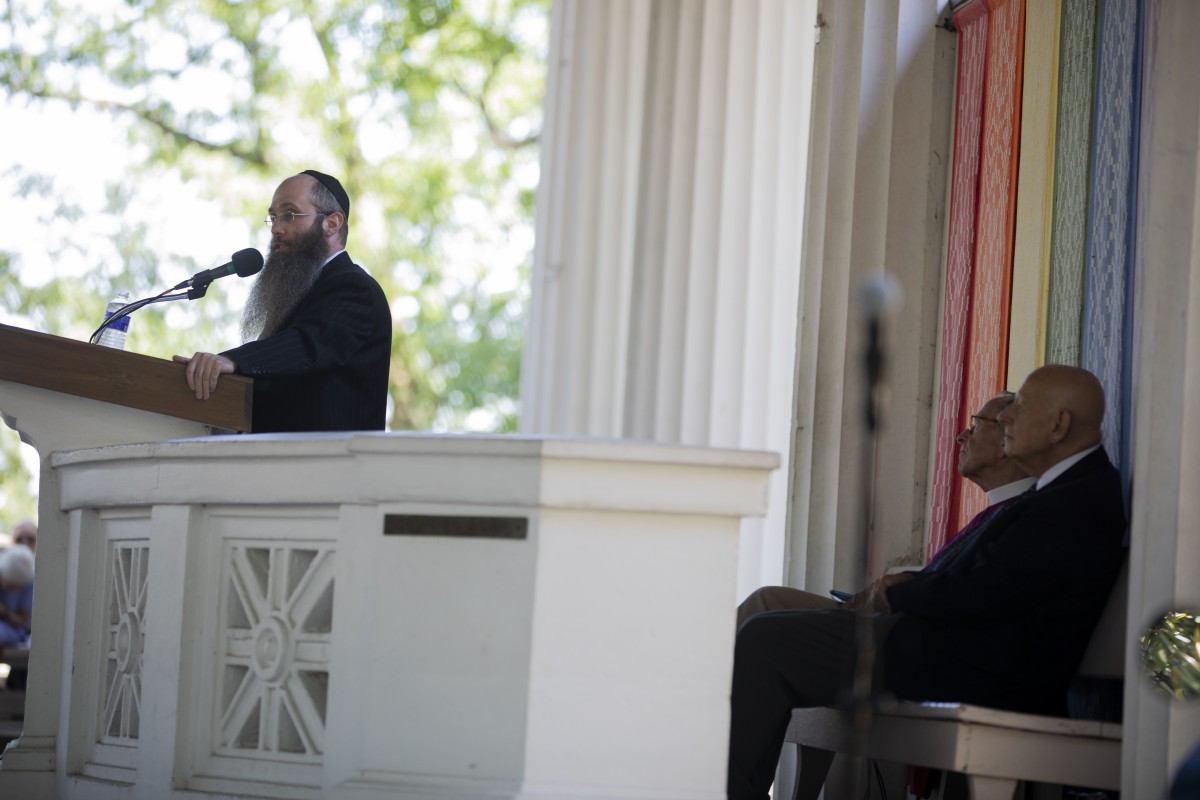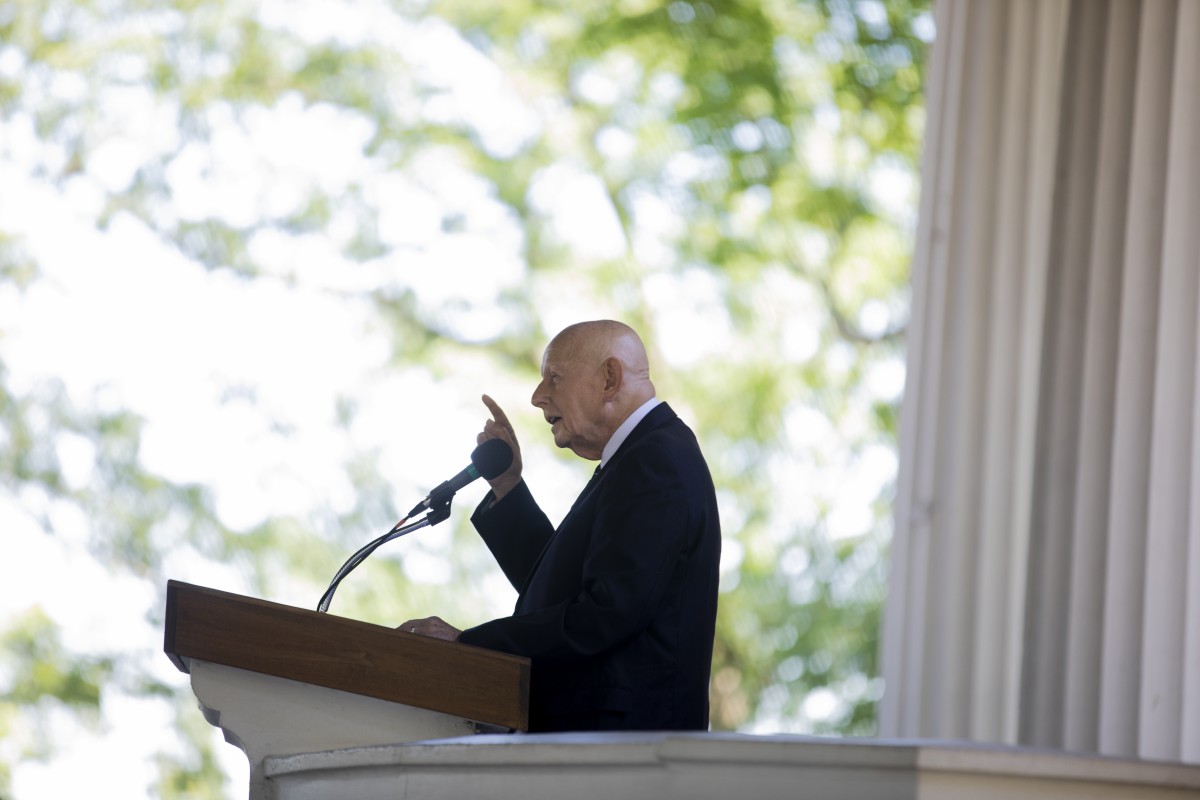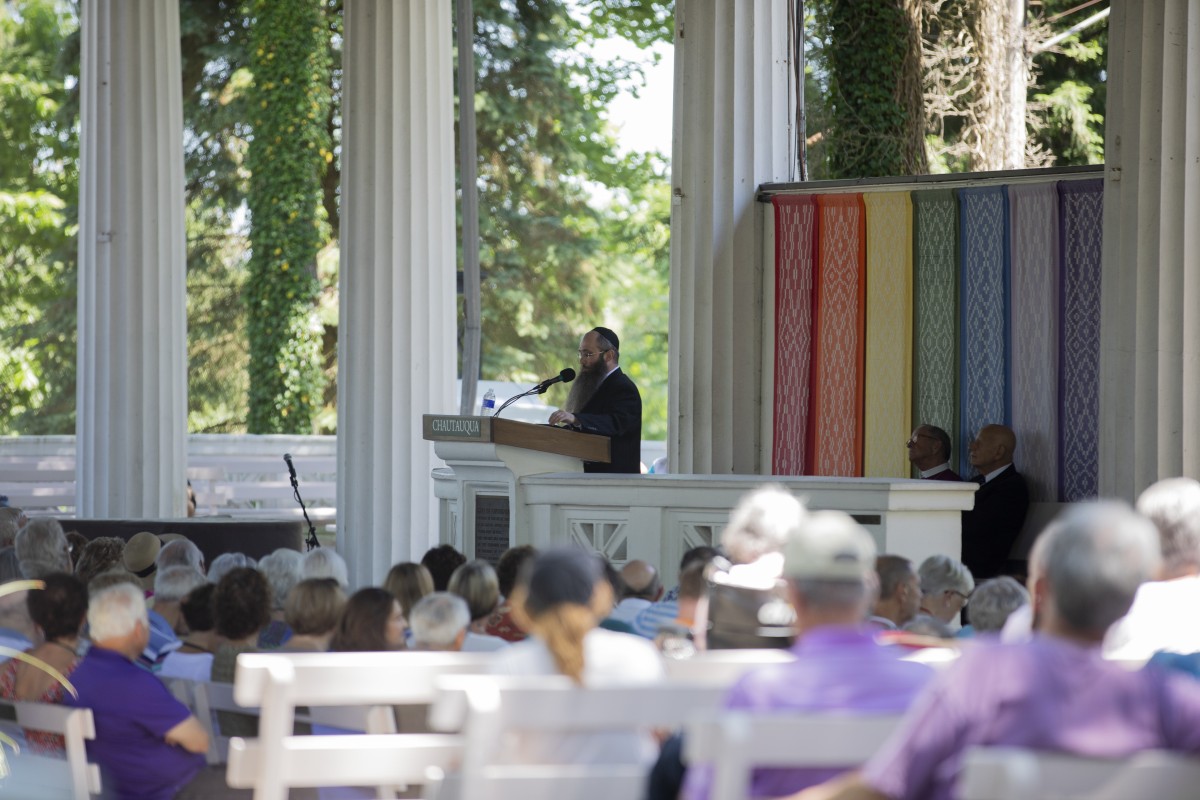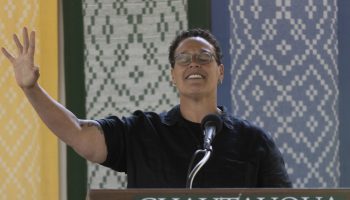Although the proverb “All work and no play makes Jack a dull boy” was coined in 1659, Rabbis Samuel M. Stahl and Zalman Vilenkin believe the current generation of workaholic Americans still need to acquire a great deal of wisdom from the centuries- old phrase.
At 2 p.m. Monday, July 9, in the Hall of Philosophy, Stahl and Vilenkin delivered a joint lecture on the importance of the Sabbath as part of the Week Three interfaith theme, “The Spirituality of Play.” Stahl’s portion of the lecture was titled “Sabbath: A Foretaste of Utopia” and Vilenkin’s was “Sabbath: A Gift of Rest.”
Stahl first came to Chautauqua in 1998, served as theologian-in-residence in 2003 and now spends his summers at the Institution. During the winter months, he advocates for interfaith work as rabbi emeritus of Temple Beth‑El in San Antonio, Texas.
Workaholism is not a new phenomenon in American life, in fact, it has been present for the past five centuries. It began with the Puritans in 1620 when they arrived at Plymouth Rock and established a work ethic they believed to be derived from God.
“They considered those who have been favorably successful to have been blessed by God and that they would be guaranteed salvation,” Stahl said.
However, instead of support from God, Scripture from two books in the Bible provide examples of workaholism. In both the book of Exodus and the book of Deuteronomy, the Ten Commandments are mentioned. These commandments are the moral code of Judaism and mandated the Sabbath, a day of rest that was highly controversial when first introduced.
“Critics of the Sabbath accused ancient Jews of being lazy,” Stahl said. “They scorned the Sabbath, and they failed to realize the dire necessity of refraining from mundane affairs for an entire day.”
The failure to see the need for a day of rest is what has carried over, and worsened, in modern-day America, Stahl said. Americans skip lunch, rush through dinner and cheat themselves out of hours of sleep in an attempt to match the quickening pace of everyday life.
“Today, we are enslaved to work,” he said. “I think workaholism has become a national addiction. We tend to work compulsively and aggressively.”
Stahl said the constant advancement of technology makes it nearly impossible to catch up.
“Many of us are chained to our computers, typing madly, claiming that our keyboards can’t keep up with our thoughts,” Stahl said. “Not long ago, our telephones were confined to our offices and our homes. Now, mobile phones are ubiquitous. We talk on our cellphones at restaurants, in public bathrooms, in our automobiles and even in lecture halls. It seems like our cellphones are appendages to our ears.”
Although workaholism can lead to destructive behavior, Stahl recognizes that the Bible displays another side of this debate in saying that work-based achievements can bring a mixture of personal satisfaction and a feeling of contentment.
“When we have profitably and successfully closed a sale, when we have published an article or a book or when we have performed a life-saving surgery, a warm sense of fulfillment and joy fills our hearts,” he said.
Stahl believes this sense of fulfillment is what causes an addiction to work, as people begin to intertwine their job and their self-image.
“We believe that by working longer hours, completing more projects and making more money, we are going to enhance our selfworth,” he said. “Unfortunately, we will discover that this approach is a terribly misguided one.”
According to Stahl, the sense of fulfillment received from these tasks is temporary and leads to a feeling of emptiness and despair as people consistently want more than what they have. As a result, the approach “distances one from oneself.”
“We are so busy we have no time to reflect, to involve ourselves in deep self-exploration or to engage in the kind of reflection that each of our religions obligates us to perform,” he said. “We have to search our souls, face our shortcomings and correct our errors.”
Without time to self-reflect, workaholism stunts spiritual growth, as people become unable to appreciate all of the blessings God has made available in the world, Stahl said.
Along with workaholism, Stahl said Americans are living in an age of isolation and individualism that leads to a feeling of overwhelming loneliness. The day of the Sabbath can alleviate these feelings by providing a sense of community.
“The Sabbath provides (a) community where we go to a synagogue and we pray next to the people we love, people who love us and care for us, where we dine at each other’s tables and find a strong human connection,” Stahl said.
Whether for the sake of community or personal growth, Stahl believes it is more important than ever for Jewish people to take the purpose of the Sabbath seriously and to use it as an example of what the world could be.
“On the Sabbath, we are obligated to be and not to do,” he said. “We must reflect and not produce. We must contemplate and not create. The Sabbath provides us with a utopian vision and gives us a chance to gain a foretaste of what the perfect world of the futurecould be like.”
In Vilenkin’s half of Monday’s lecture, he discussed what God has provided through the gift of the Sabbath, also known as the “Shabbat.”
Vilenkin is a longtime Chautauquan and executive director and spiritual leader of Chabad Lubavitch of Chautauqua. He teaches Jewish philosophy and Kabbalah at the United Talmudical Seminary in Brooklyn during the off-season.
The purpose of Shabbat is explained by its very definition, which is “to rest” and “to return.”
“It is not just about working, but really an opportunity to return to oneself,” Vilenkin said, “to return to one’s origins and connect to God.”
Vilenkin referred to the same two passages of the Ten Commandments in the Bible, but focused on their differences.
In the book of Exodus, it says to remember the day of the Shabbat.
“For six days, the Lord made heaven and earth, and he rested on the seventh,” he said. “Therefore, the Lord was the Shabbat.”
In the book of Deuteronomy, it says not to remember, but to protect and preserve the Shabbat.
“You should remember that you are a slave of the land of Egypt and that the Lord your God took you out of there with a strong hand and an outstretched arm,” he said. “Therefore, Lord your God commanded you to observe the Sabbath.”
Vilenkin said these differing messages are not contradictory, but rather complimentary in the way that both affirm the Shabbat as an example of how God’s efforts are continuous and everlasting.
“God continuously is creating, sustaining and vitalizing the world,” he said. “When we rest on Shabbat, we are confirming our belief in God as a creator, but we are also attesting to the fact that God did not create the world within limitation, but that God is actually continuously involved and invested in our lives, the good and the bad. He is always there.”
Shabbat is not only a testimony of faith, but a test of faith to see if one will rely on God to continue to provide for his people.
“Although the world might appear autonomous and independent, the truth is that every additive, every cell, every weight of energy is constantly dependent on his existence,” Vilenkin said. “On a personal level, it is the acknowledgment that all of the talents we have, all the skill that we have, all of the work that we do is really a gift from God, a continuous gift from God for which we can’t claim credit.”
According to Vilenkin, this continuous effort shows God’s intent in making work a permanent part of life on earth.
“If God wanted to look at work just as means to an end, he could have created and designed the world a little bit better,” he said. “He could have created a world where we don’t have to work, where we can rest and celebrate Shabbat 24/7. Yet, he designed a world that is incomplete without work, that assesses human effort and human involvement because it is a part of the plan. There is a spirituality to work.”
Although Vilenkin stressed the importance of giving credit to God, he is still convinced that the greatest lessons learned through the Sabbath are through self-discovery.
“The journey of life is through our own efforts, our own struggles, our own turbulence and with our own free will, to discover the underlying truth of God within the devices of creation,” he said.







